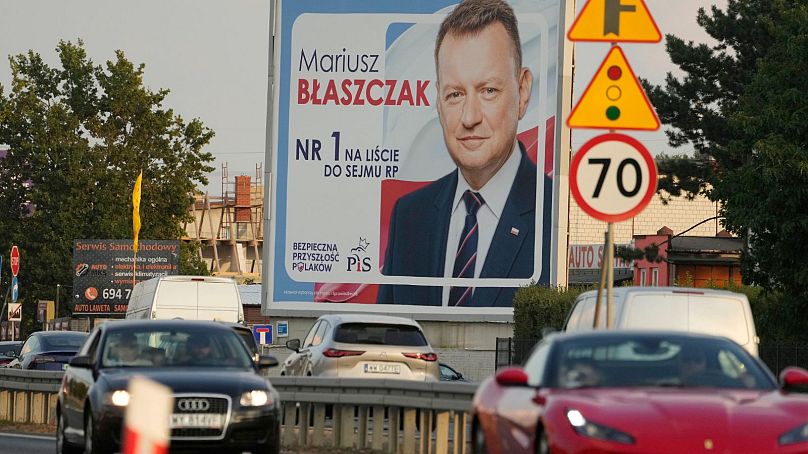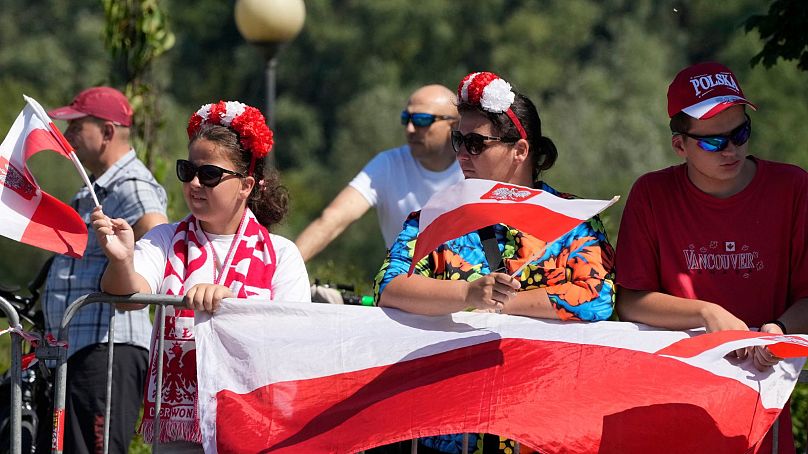The vote of women in the incoming parliamentary election in Poland could be crucial in determining whether the PiS will hold on to power - or would be punished for restricting access to abortion in the country, experts say.
As a crucial parliamentary election which could weaken the ruling Law and Justice (PiS) party’s hold on to power quickly approaches in Poland, experts are wondering what role women will have in determining the future of the country.
Less than a month ahead of the 15 October election, the PiS - which has been in power since 2019 - could take home a victory but fail to reach an overall majority.
This opens the possibility of a potential coalition between the PiS and the ascending far-right party Confederation Freedom and Independence (Konfederacja Wolsność i Niepodległość), currently the third party in the country; or another coalition led by the current opposition, Donald Tusk’s Civic Coalition party (Koalicja Obywatelska), currently the second party in the polls.
Women, who have suffered a crackdown on abortion rights sponsored by the PiS with the backing of the local Catholic church about three years ago, might prove a wild card in the incoming election - either supporting the ruling party or turning against it.
According to Simona Guerra, a professor in Comparative Politics at the University of Surrey and an expert on Polish politics, the PiS’ policies after 2019 have taken “a more radical, illiberal and anti-European stance on most social, cultural, and economic issues - and also and above all, on the rights of women and minorities.”
Since the Polish government banned most abortions in the country, “women have died,” Guerra told Euronews. “This election would be important for women, because while there are those who can afford to have abortions abroad, there are those who cannot.”
According to Anita Prazmowska, a professor at the London School of Economics and Political Science (LSE) and an expert in Polish politics and history, women in Poland are being treated like “animals” and being reduced to only one purpose, “to give birth.” Despite the Polish government’s efforts to promote pregnancy and reduce access to abortion, the country’s birth rate is still one of the lowest in Europe.
“So what is happening? The answer is illegal abortions,” Prazmowska told Euronews. “Educated, wealthy women can go to the Czech Republic and Western Europe to have an abortion, but women in the rural villages don’t have that option.”
A turn of the screw on abortion access
In 2021, the Polish government imposed a near-total ban on abortion which only allowed the procedure in case the pregnancy threatens the pregnant person’s life or health or it’s the result of rape or incest. of But Prazmowska said that things are worse than the strict law would suggest.
“Though, in principle, abortion is legal in cases of rape, incest and foetal abnormality, as well as in proven cases of threat to women’s health, no hospitals are willing to perform illegal abortions,” Prazmowska said, “because hospitals are dominated by local political groups and fearful of accusations by the church.”
There were two cases in the past two years where women were refused treatment in hospital despite carrying a dead foetus inside them and died of septicemia - blood poisoning by bacteria.
A lack of alternatives
While the Polish government’s crackdown on abortion has sparked huge, nation-wide protests across the country in 2020, “that energy has dissipated,” Prazmowska said.
Educated and working women in Poland’s capital and big cities will certainly think so, she added, “but that’s not enough. Normally, the women’s vote is very conservative, very church-bound. In Poland, the Church controls the villages and the rural areas of the country very, very successfully.”
Prazmowska said that “women’s circumstances in Poland are unbelievable, adding that she wouldn’t know what to compare them with. “Will women see themselves as a group that can actually vote and make their voice matter?,” she asked.
Women who might be unhappy with the way they’ve been treated by the government lack alternative parties who push forward political agendas which actively protect their rights, according to the expert.
“The past rage [over a crackdown on abortion access] has not taken the form of parties creating different programmes fighting this, because everybody talking about abortion, contraception is faced with such a violent reaction in Poland,” she continued.
“State television is now mainly controlled by the ruling party, while independent news media are mostly online,” she added. “On state television, the formal discussion is so violent, so hostile towards women that nobody dares put their head over the parapet,” she continued.
“It would take a very brave person. There have been, but they have not managed to build a platform.
More female candidates for Tusk
Tusk’s Civic Coalition party has been trying to mobilise the female electorate, with a record 44% of women candidates in the incoming election. The party has plans to send buses of its women candidates around Poland to promote themselves and invite women to vote for their agenda defending women’s rights.
Part of the party’s agenda is overturning the current near-total ban on abortion and legalising the procedure up to 12 weeks of pregnancy. Earlier this year, Tusk declared that women’s rights are the country’s “number one” issue.
But the former European Council head has been criticised by feminists in the country for using the issue to promote his party, having done little to promote and defend women’s rights while he was in office as prime minister between 2007 and 2014.
Family, church, and politics
There’s also an issue of reaching women in rural areas, Prazmowska said, where women have historically supported the most conservative parties.
According to Prazmowska, outside of Poland’s big cities where women can be independent, “women are still very economically dependent on society as a whole, their families, and their husbands.”
Under these circumstances, women traditionally vote conservative, seduced by a political rhetoric that promises to prioritise families, defend women, and take care of their children - even if what they’re doing is solidifying their dependent role in the traditional patriarchal family.
“It is the older women who vote, not the young women,” said Prazmowska, explaining that the process of secularisation ongoing in Poland has not yet reached the majority of the electorate.
“Older women will likely still vote the same party, the PiS, if they’re going to vote at all,” she said, admitting she’s pessimistic about any political change being driven by the women’s vote, though she’d wish for it.
“This government is just giving women money to sit at home and have children. It destroys any economic incentive to acquire skills and find a good job. Women who don’t want to do that are leaving for Western Europe - Italy, Greece, Germany. So, who’s left to change the situation in Poland?”













